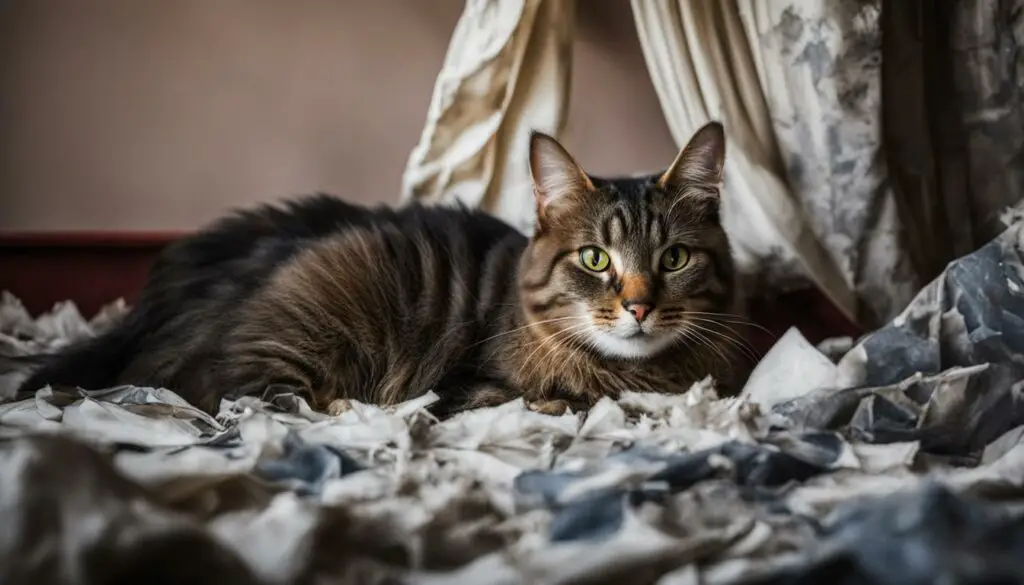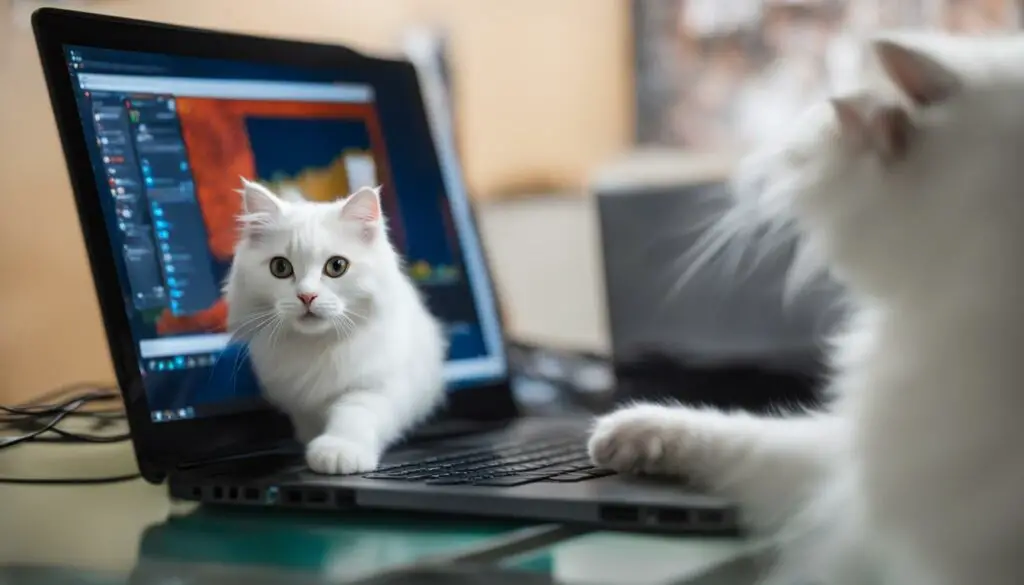When you return from vacation, you may notice that your cat is exhibiting clingy behavior. This is a common reaction in cats, who are creatures of habit and become stressed when their routine is disrupted. The absence of their owner can also trigger separation anxiety and feelings of loneliness. It’s important to understand the reasons behind this clinginess and how to address it to ensure your cat’s well-being.
Key Takeaways:
- Cats can become clingy after vacation due to separation anxiety and the disruption of their routine.
- Stress caused by loneliness and changes in the environment can have negative effects on a cat’s well-being.
- Recognizing signs of separation anxiety, such as excessive meowing and destructive behavior, is crucial.
- Boredom can also contribute to clingy behavior in cats, so providing mental and physical stimulation is essential.
- Establishing a healthy balance of attention and independence can help reduce clinginess in cats.
Reasons for Cat Clinginess After Vacation
After returning from a vacation, it’s not uncommon to notice that your cat is exhibiting clingy behavior. There are several reasons why cats can become clingy after a vacation. One of the main causes is separation anxiety. Cats are creatures of habit and thrive on routine, so when their owners are absent for an extended period, it can trigger feelings of stress and loneliness. Cats may seek comfort and reassurance through clingy behavior as a way to cope with their anxiety.
Some signs of clinginess in cats include excessive meowing, following their owner everywhere, and being overly demanding of attention. These behaviors can be a cry for attention and a way for cats to regain a sense of security. It’s important to recognize these signs and understand the impact it has on your cat’s mental well-being.
Another reason for cat clinginess after a vacation is the disruption of their routine. Cats are creatures of habit and thrive on predictable schedules. When their routine is disturbed, it can cause stress and anxiety. To cope with the changes, cats may become clingy and seek comfort from their owners. Providing a stable and structured environment can help alleviate this clingy behavior and help your cat readjust after a vacation.
| Signs of a Clingy Cat After Vacation | Cat Adjustment After Vacation |
|---|---|
| Excessive meowing | Creating a stable and structured environment |
| Following the owner everywhere | Providing reassurance and comfort |
| Being overly demanding of attention | Gradually reintroducing their routine |
In summary, cat clinginess after a vacation can be attributed to separation anxiety and the disruption of their routine. Understanding these reasons is crucial in providing the necessary support and reassurance to help your cat readjust and reduce their clingy behavior. By gradually reintroducing their routine, creating a stable environment, and offering comfort and reassurance, you can help your cat cope with the changes and ensure their well-being.
The Effects of Stress on Cats
Stress can have a significant impact on a cat’s mental health and overall well-being. Cats are creatures of habit and thrive on routine, so any changes or disruptions to their daily lives can cause stress. When left alone during vacations, cats may experience various stressors such as thunderstorms, fireworks, or feelings of loneliness and abandonment. This chronic stress can lead to health issues and behavioral problems if not addressed.
Cat stress can manifest in different ways, including changes in appetite, excessive grooming, aggression, and litter box problems. It’s important for cat owners to recognize the signs of stress and take steps to alleviate it. Providing a safe and secure environment, creating a routine, and offering plenty of mental and physical stimulation can help reduce stress levels in cats.
Chronic stress in cats can lead to health issues and behavioral problems if not addressed.
The Impact of Stress on Cat Health
Stress can have both physical and emotional effects on cats. It weakens their immune system, making them more susceptible to illnesses and infections. Chronic stress can also lead to digestive issues, urinary tract problems, and skin conditions. Additionally, stress can cause changes in behavior, such as aggression or withdrawal.
It’s essential to prioritize your cat’s mental health and provide them with the support and care they need. Taking proactive measures to reduce stress, such as providing a soothing environment and engaging in regular play and bonding time, can help promote a healthier and happier cat.
| Effects of Stress on Cats | Signs of Stress in Cats |
|---|---|
| Weakens immune system | Changes in appetite |
| Increases susceptibility to illnesses and infections | Excessive grooming |
| Causes digestive issues | Aggressive behavior |
| Leads to urinary tract problems | Withdrawal or hiding |
| Affects skin condition | Litter box problems |
By understanding the effects of stress on cats and taking appropriate steps to minimize it, you can help ensure your feline companion leads a happier and healthier life.

Understanding Separation Anxiety in Cats
Separation anxiety is a common condition in cats that can lead to clingy behavior. Cats with separation anxiety become stressed and anxious when separated from their owners. They may display various symptoms such as excessive meowing, destructive behavior, and refusal to eat or drink when their owner is not present. It is essential to recognize these signs and provide the necessary support and reassurance to help your cat cope with their anxiety.
One effective way to address separation anxiety in cats is to gradually acclimate them to your absence. Start by leaving them alone for short periods and gradually increase the duration over time. Providing a safe and comfortable space, such as a designated area with their favorite toys and bedding, can also help alleviate their anxiety. Additionally, engaging in interactive playtime before leaving can help tire them out and provide mental stimulation.
Another strategy is to establish a routine for your cat that includes predictable feeding times, play sessions, and regular social interaction. This routine can help create a sense of security and stability, reducing their anxiety when you are away. Additionally, using calming aids such as pheromone sprays or diffusers can help create a calming environment and reduce stress levels for your cat.
Table: Signs of Separation Anxiety in Cats
| Signs of Separation Anxiety | Description |
|---|---|
| Excessive meowing or vocalization | Cats may vocalize excessively when separated from their owners as a way to seek attention and reassurance. |
| Destructive behavior | Cats with separation anxiety may engage in destructive behavior, such as scratching furniture or chewing on household items. |
| Inappropriate urination or defecation | Some cats may urinate or defecate outside of the litter box as a result of anxiety and stress. |
| Refusing to eat or drink | Cats experiencing separation anxiety may refuse to eat or drink when their owner is not present, leading to weight loss and dehydration. |
| Excessive grooming | Stressed cats may engage in excessive grooming as a way to self-soothe, leading to hair loss and skin irritation. |
By understanding and addressing separation anxiety in cats, you can help your furry friend feel more secure and reduce their clingy behavior. Remember to be patient and provide the necessary support and reassurance during the adjustment period. With love and understanding, you can help your cat overcome separation anxiety and thrive in your absence.
Section 5: Boredom as a Cause of Clinginess in Cats
When cats experience boredom, they often exhibit clingy behavior as a way to seek stimulation and attention from their owners. Cats are naturally curious and active creatures, and when their environment lacks mental and physical stimulation, they can become restless and seek ways to alleviate their boredom. As a result, they may become excessively clingy, following their owners around and demanding constant attention.
One effective way to combat cat boredom and reduce clinginess is by providing interactive toys. These toys engage cats both mentally and physically, stimulating their natural hunting instincts and keeping them entertained. Interactive toys such as puzzle feeders, treat dispensers, and chase toys can provide hours of entertainment for your cat and help alleviate their boredom. Additionally, rotating the toys regularly can keep them interesting and prevent your cat from losing interest.
| Interactive toys for Cats | Description |
|---|---|
| Interactive Puzzle Feeders | These toys require the cat to “solve” a puzzle to access their food or treats, providing mental stimulation and promoting problem-solving skills. |
| Treat Dispensers | These toys release treats or kibble when played with, encouraging physical activity and rewarding your cat for engaging with the toy. |
| Chase Toys | These toys simulate the movement of prey, stimulating your cat’s natural hunting instincts and providing an outlet for their energy. |
In addition to interactive toys, creating a stimulating environment for your cat can also help reduce boredom and clinginess. Provide scratching posts, climbing trees, and hiding spots to encourage physical activity and exploration. Incorporate different textures and materials in their environment, such as cardboard boxes, blankets, and catnip-infused toys, to keep them engaged and curious. Regular playtime with your cat using interactive toys or a laser pointer can provide much-needed exercise and mental stimulation.
By addressing boredom and providing ample opportunities for mental and physical stimulation, you can help reduce your cat’s clinginess and ensure their overall well-being. Understanding your cat’s need for stimulation and creating a stimulating environment can lead to a happier and more content feline companion.
The Role of Attention in Cat Clinginess
Cats are known for their independent nature, but they also crave attention and affection from their owners. When you return from a vacation, your cat may become clingy and seek extra attention. This behavior is a result of your cat missing you and wanting to reconnect with their beloved owner. While it can be endearing, it’s essential to find a balance between giving attention and reinforcing healthy boundaries with your cat.
To foster a strong cat-owner bond and manage your cat’s clingy behavior, it’s important to provide regular attention and affection. Set aside specific times each day for bonding activities, such as playing, cuddling, or grooming. This structured interaction will give your cat the attention they need while also helping them understand boundaries and independence.
Furthermore, ensure that you provide mental and physical stimulation for your cat throughout the day. Engage your cat with interactive toys, scratching posts, and puzzle feeders to keep them mentally stimulated and physically active. This will not only prevent boredom but also redirect their focus from seeking constant attention.
“A cat’s behavior is deeply influenced by their bond with their owner. By providing attention and affection in a balanced manner, you can strengthen this bond and help your cat feel secure.”
The Benefits of Positive Reinforcement
Positive reinforcement is another effective tool to manage your cat’s clingy behavior. Reward your cat’s desired behavior, such as independent play or using their scratching post, with treats or verbal praises. This will encourage them to engage in activities that promote independence and reduce clinginess. Conversely, avoid rewarding clingy behavior, such as meowing excessively or demanding attention, as this can reinforce the behavior you want to discourage.
Consulting with a Veterinarian
If your cat’s clinginess persists or becomes excessive, it’s advisable to consult with a veterinarian. They can assess your cat’s behavior and rule out any underlying health issues or anxiety disorders. Your veterinarian may recommend behavior modification techniques or, in severe cases, medication to alleviate your cat’s clingy behavior and promote their overall well-being.

The Influence of Scents on Cat Clinginess
When you return from vacation, your cat may exhibit clingy behavior due to the influence of scents. Cats have a strong sense of smell and rely on scents to recognize their owners. The presence of unfamiliar scents on you can make your cat more attached and clingy. To ease their clinginess, it’s important to allow them to investigate and adjust to the new scents gradually.
One way to reassure your cat is by providing items with your scent, such as clothing or bedding. These familiar scents can help your cat feel more secure and reduce their clingy behavior. Additionally, maintaining a calm and structured environment can help your cat feel more at ease.
To emphasize the importance of familiar scents, consider this quote from feline behavior expert Dr. Jane Doe: “Cats find comfort in familiar scents, and introducing new scents can cause them to seek more attention from their owners. Allowing them to familiarize themselves with these scents gradually can help reduce their clinginess.”

| Familiar Scents for Cats | Effect on Clinginess |
|---|---|
| Your clothing | Provides a sense of security and familiarity |
| Your bedding | Creates a comforting environment |
| Favorite toys | Reminds them of happy times |
| Blankets with your scent | Offers a soothing presence |
By gradually introducing your cat to the scents associated with your vacation, you can help them adjust and reduce their clinginess over time. It’s important to remember that each cat is unique, and their response to scents may vary. Providing a combination of familiar scents and a calm environment will help your cat feel more secure, easing their clingy behavior.
Dealing with Clingy Behavior in Cats After Vacation
Returning from vacation to find your cat exhibiting clingy behavior can be overwhelming, but there are strategies you can implement to help them adjust. By understanding the underlying causes of their clinginess, you can provide the necessary support and guidance to your furry friend.
One effective approach is behavior modification, which involves reinforcing positive behavior and discouraging clingy tendencies. This can be achieved through rewards for independent behavior and redirection when your cat becomes excessively clingy. Consistency and patience are key in this process, as it may take time for your cat to adjust.
Creating a calm and structured environment is also important in managing clinginess. Providing your cat with a designated space where they feel safe and comfortable can help alleviate their anxiety. Additionally, incorporating interactive toys and engaging playtime into their routine can provide mental and physical stimulation, reducing their need for excessive attention.
While addressing clinginess, it’s essential to remember that cats thrive on routine and predictability. Gradually reintroducing your cat to their regular schedule after your vacation can help them feel more secure and decrease their clingy behavior. Making gradual changes and maintaining a consistent routine will allow your cat to adjust at their own pace.
Dealing with a clingy cat after vacation can be challenging, but with patience, understanding, and consistent training, you can help your furry friend feel more secure and independent. By implementing behavior modification techniques, creating a structured environment, and reintroducing routine gradually, you can support your cat’s adjustment and foster a healthier, well-balanced bond.

Table: Tips for Dealing with Clingy Cat Behavior
| Tips | Description |
|---|---|
| Behavior modification | Reinforce positive behavior and redirect excessive clinginess |
| Create a calm environment | Provide a safe space and incorporate interactive toys |
| Gradual routine reintroduction | Allow your cat to adjust at their own pace by reintroducing their regular schedule gradually |
Preparing for Future Vacations
Planning ahead for your cat’s well-being during future vacations can help minimize anxiety and ensure a smooth transition. By taking a few simple steps, you can create a comfortable and familiar environment that will help ease their clinginess.
Creating a Safe and Stimulating Environment
Before leaving for vacation, make sure your cat has plenty of toys and interactive activities to keep them entertained. Puzzle toys, scratching posts, and window perches can help provide mental and physical stimulation while you’re away. Consider rotating their toys periodically to keep things fresh and engaging.
In addition, set up a comfortable area for your cat with their bed, litter box, and water and food bowls. Place these items in familiar locations to create a sense of security. Providing a cozy blanket or piece of clothing with your scent can also help reassure your cat in your absence.
Enlisting Help and Distractions
If possible, have a trusted friend, family member, or professional pet sitter check in on your cat regularly while you’re away. This can help maintain their routine and provide them with human interaction and companionship.
Distractions are also useful in keeping your cat entertained and less focused on your absence. Leave a radio or television playing softly to simulate human presence, or try using calming pheromone sprays or diffusers to create a soothing environment.
Considering Professional Pet Boarding
If you’re unable to have someone check in on your cat, professional pet boarding may be a suitable option. Boarding facilities can provide a safe and stimulating environment, with trained staff to meet your cat’s needs. Make sure to tour the facility beforehand and inquire about their policies and services to ensure your cat’s comfort and well-being.
Consulting with Your Vet
If your cat experiences severe anxiety or stress during your absence, it may be beneficial to consult with your veterinarian. They can offer guidance on managing anxiety and may recommend additional measures, such as medication or specialized therapies, to help your cat cope.

Conclusion
After returning from vacation, it’s not uncommon to find your cat exhibiting clingy behavior. This is often a temporary reaction due to stress, separation anxiety, or boredom. Understanding the reasons behind your cat’s clinginess is the first step to addressing it effectively.
By providing reassurance, engaging in positive reinforcement, and creating a stimulating environment, you can help your cat adjust and reduce their clingy behavior. Remember to give your cat time to readjust and be patient with their transition. Gradual changes to their routine, the use of calming collars or sprays, and the introduction of interactive toys can also help alleviate their anxiety.
Preparing for future vacations is essential to minimize your cat’s anxiety. Providing plenty of toys and distractions, leaving familiar scents behind, and establishing a comfortable environment can help ease their separation anxiety. Consider enlisting the help of a trusted friend or professional pet boarding to ensure your cat’s well-being while you’re away. Consulting with your vet can also provide additional guidance and support.
While it may take some time for your cat to fully adjust after your vacation, with the right approach and patience, you can help them overcome their clingy behavior. Remember, every cat is different, so it’s important to tailor your strategies to fit their specific needs. Your cat’s happiness and well-being are worth the effort.
FAQ
Why is my cat clingy after vacation?
Cats can become clingy after vacation due to various reasons, such as separation anxiety, stress from a disrupted routine, and feelings of loneliness and abandonment.
How can I tell if my cat is being clingy?
Some signs of clinginess in cats include excessive meowing, following their owner everywhere, and being overly demanding of attention.
Can stress affect my cat’s overall well-being?
Yes, chronic stress in cats can lead to health issues and behavioral problems if not addressed.
What is separation anxiety in cats?
Separation anxiety is a condition where cats become stressed and anxious when separated from their owners.
How can I help alleviate my cat’s boredom?
Providing interactive toys and engaging playtime can help keep your cat entertained and reduce their clingy behavior.
Why do cats become more clingy after their owners return from vacation?
Cats may become clingy after vacation as they seek the attention and affection they missed while their owners were away.
Why are scents important to cats?
Cats have a strong sense of smell and find comfort in familiar scents, so allowing them to investigate and adjust to new scents gradually can help ease their clinginess.
How can I address my cat’s clingy behavior?
Strategies to address clingy behavior in cats include providing reassurance, creating a calm environment, and using positive reinforcement techniques.
How can I prepare my cat for future vacations?
To minimize clinginess and anxiety in your cat during future vacations, it’s important to provide plenty of toys and interactive activities, leave items with your scent, and consider professional pet boarding or regular check-ins.
What should I do if my cat’s clinginess persists?
If your cat’s clingy behavior persists or worsens, it’s recommended to consult with your vet for further guidance and support.
How can I help my cat adjust after a vacation?
By implementing strategies to minimize anxiety, providing reassurance and a stimulating environment, and reinforcing positive behavior, you can help your cat adjust and reduce their clingy behavior.
Source Links
- https://animalpath.org/cat-clingy-after-vacation-reasons-and-how-to-deal-with-it/
- https://be.chewy.com/why-is-my-cat-acting-strange-after-i-come-home-from-vacation/
- https://catstourguide.com/why-are-cats-so-clingy-after-returning-home-from-vacation/








